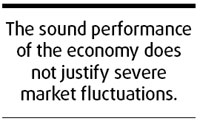Overshooting worries
(China Daily)
Updated: 2008-04-21 07:21
Updated: 2008-04-21 07:21
With PetroChina sinking below its initial offer price, the stock market risks overreacting to the country's economic slowdown. Policymakers should take measures to prevent investors' confidence from collapsing.
Last Friday, shares in the nation's biggest oil company dropped 5 percent to 16.02 yuan, below the initial offer price of 16.70 yuan, for the first time since they began trading in the domestic stock market on November 5, 2007. The stock has plunged by almost two thirds since it peaked at its debut on the Shanghai stock exchange.

This surely dealt a heavy blow to Chinese stock investors who helplessly watched the benchmark index being dragged below the psychological level of 3,100, the lowest in 13 months.
PetroChina has flirted with its initial offer price for a while, stopping short of breaking it. That once made some investors believe that the drastic correction of the Chinese stock market might be approaching the end. But now, with the possibility of PetroChina shares dropping further in the coming months wide open, investors' confidence has been dampened again.
For policymakers who have been resolute about preventing asset bubbles since early last year, the correction, that has by now lowered the benchmark Shanghai Composite Index by about 50 percent from a record 6124.04 set in October, looks quite necessary. The Shanghai Composite Index had more than doubled in value last year, on top of a 130-percent surge in 2006, before finally losing steam.
Undoubtedly, unsustainable rises in share prices had posed a serious threat to the national economy. The asset bubble then fuelled by rocketing share prices made it difficult for the government to tame consumer inflation that was accelerating and to cool economic growth that might have been overheating.
However, thanks to all the tightening measures the government has adopted, the Chinese economy is now slowing gradually, as expected. To some extent, it is doing so even better than expected.
It is reasonable for the stock market to respond to the economic slowdown that will affect most listed companies' profit growth. But that does not mean that policymakers should leave the market to overshoot as much as it wants.
The sound and stable performance of the Chinese economy does not justify severe fluctuations in the stock market.
(China Daily 04/21/2008 page4)
|
|
|
|